Laura Jimenez Garcia, a third-year law student at the University of Georgia, lived in her birth country of Colombia until she was 5 years old. When she and her mother immigrated to the United States, they settled in Gwinnett County, Georgia.
Navigating this new world at a young age forced Jimenez Garcia to understand concepts well beyond her years. Though navigating this as a preschooler was stressful, Jimenez Garcia said, “it followed me to law school.”
Originally wanting to pursue a career in psychology to research cultural immigration issues, she pivoted to law school so she could “work with the people who made me who I am,” Jimenez Garcia said.
Many Latino and Hispanic students pursue careers as lawyers for this reason, Jimenez Garcia said, to provide support for their community.
However, Latina women struggle with representation in law school and are underrepresented in classrooms and courtrooms. Though women outnumbered men for law school enrollment in 2022, roughly 40% of lawyers in the United States are women, and of that percentage 2% are Latinas, according to Latinicida.
Why It’s Newsworthy: Latina law students are vital to ensuring classrooms are diverse. With 6.7% of UGA law school’s student body being Hispanic or Latino, underrepresentation can impact the success of these students.Cultural Barriers
Understanding Latina underrepresentation requires thorough attention to the mix of issues that a Latina law student must face to pursue a career as a lawyer.
First-year law student Rosalie Vendrell was born in Valdosta, Georgia, but her mom and dad were born in Puerto Rico.
Since she grew up in South Georgia as a Latina, her parents urged Vendrell to speak English to protect her from discrimination. Vendrell’s identity and experiences in life as an Afro-Latina fueled her passion for social justice, and she is pursuing that interest in law school.
Vendrell is a first-generation college student and the first in her family to attend law school.
“If students here have parents that both have a college education or went to a four-year university, it’s not the same [for Latino and Latina students] because if you were to ask your parents a question they could help you,” Vendrell said. “I don’t have that additional help that other people could have from their family alone, much less the connections they’ve made.”
Stereotypes Limit Respect Given to Latina Students
Catalina Buchek, a first-year law student at UGA, immigrated to the United States from Buenos Aires, Argentina six years ago.
Buchek moved to the U.S. because of her mother’s job. She was inspired by her mother at a young age, always noticing how hardworking she was.
Traditionally, Latinas are the backbone of their family, Jimenez Garcia said. They manage and care for the home. Stereotypes and tradition collide for many Latinas who are entering law school. One such tradition that Latinas often face is caring for and managing the home.
“One reason I went to law school is because of the underrepresentation of our women in the workforce,” Buchek said. “I grew up with my mom not picking me up from school. So I started learning about how underrepresented we are, how much less we earn in the workforce.”
Vendrell said breaking these stereotypes is necessary to be respected in law school and in other spaces.
“Sometimes people just do not take me seriously. But if someone else were to say the same thing, it’ll be noticed,” Vendrell said. “It’s like, why do I feel like I need a credential for you to actually listen to what it is I am saying?”
Mental Exhaustion of Being the ‘Helper’
Jimenez Garcia said the issue of underrepresentation is not that Latinas are incapable of being amazing lawyers. The problem, Jimenez Garcia said, is the mentality of being a “helper,” because Latinas will chase the need to help others and be extraordinary, even if it means sacrificing their own mental health.
The “helper” role is a big reason why Latinas pursue a law degree, Jimenez Garcia said. But it comes at a price that dissuades many undergraduate Latinas to even try to attend law school.
“I know that I’m going to have J.D. next to my name in a year, but even then, sometimes I’m like, ‘Why am I in this helping position, as opposed to in the spotlight?,’” Jimenez Garcia said. “It’s all tied up in the same dynamic that Latinas are always looking out for other people before themselves. So [in law school], you’re in a space where you can look after yourself and you don’t know how to do it.”
UGA Law’s Support and Solutions
More than 70% of current law students at UGA are white, according to Law School Transparency. Law School Transparency is a nonprofit organization that provides law school statistics across the United States.
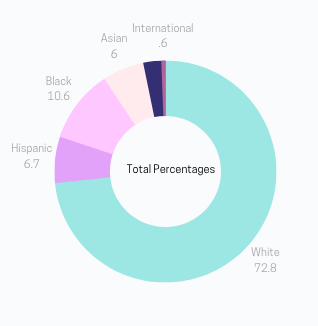
“Although the numbers are small, I feel like the school is trying to balance it out… I really believe that the faculty here is working on behalf of me and advocating for me,” Vendrell said.
According to the law students, groups like the Hispanic & Latino Law Students Association (HLLSA) are important to their wellbeing. The association creates an environment where students can talk to others for support and to make friends.
“Before applying I thought I was going to be the only Latina in school,” Buchek said. “But once I got in, the admissions staff connected me with HLLSA, and it was such a nice connection to make.”
The faculty of UGA Law provides overwhelming support for its Latinas, Buchek said. The school works on an “open door” policy, meaning that if a faculty member’s door is open, you can enter and ask for academic or personal advice, Vendrell said.
It is important for faculty to connect minority students to bigger opportunities, Jimenez Garcia said.
“When you are a minority walking into a predominately white space, you’re always going to question whether they’re really going to advocate for you as much as they’re saying,” Vendrell said. “And so far, my experience has felt very advocated for, and I can only hope that we can continue to make UGA more inclusive.”
Why We Need Latina Law Students
Buchek said that for generations Latinas have always been the ones to speak up.
We are the ones that ask questions in class. We are the ones who apply to anything. It’s our advantage,” Buchek said.
Jimenez Garcia said it’s important to have these voices and break the cycle of lawmakers.
“If the people who get to come up with what the law will look like tomorrow are the same people who did it 200 years ago, then nothing will be different,” Jimenez Garcia said.
Attending law school shows that Latinas are not leaving legal spaces. And, it reassures Latinas that “you don’t have to be boxed into what society has said before you,” Vendrell said.
Jimenez Garcia said that being in these spaces makes a career in law realistic for young Latinas, because at the end of the day, “someone is watching.” She mentioned being in positions of power as a Latina is vital to reassuring young Latinas that their dreams are possible.
“I’m the little girl who watched my immigration attorney help my family get naturalized,” Jimenez Garcia said. “She’s the one who planted a seed for me. She’s a beautiful Latina attorney who owns her own firm, and she doesn’t know she’s part of the reason I applied to law school, but she is.
“So maybe one day, we get to be that for somebody. That alone is why it’s important for us to be here.”
Natalia Duron is a senior majoring in journalism at the University of Georgia.


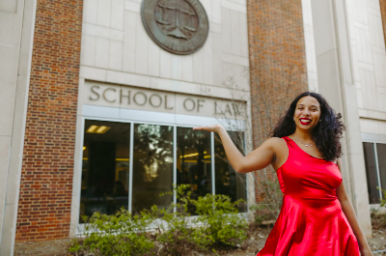



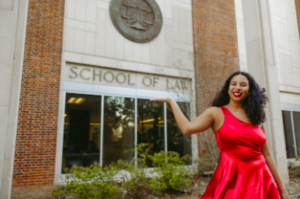
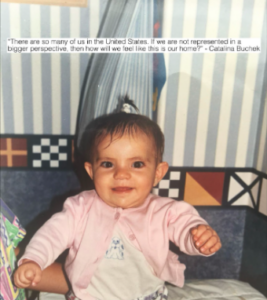


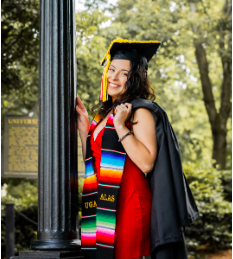




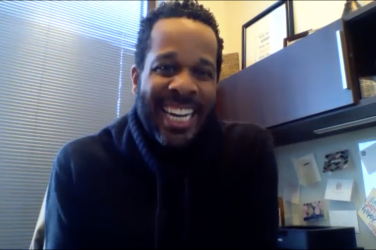



Show Comments (1)